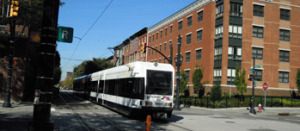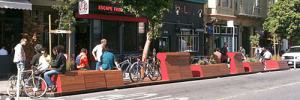The latest installment of the Planners Across America series interviews John Rahaim, planning director for the City and County of San Francisco, about the heightened passions and perpetual controversies of planning in the City by the Bay.
Planners Across America: Josh Whitehead Helps Memphis Live Within Limits
Josh Whitehead, planning director of the Memphis and Shelby County Office of Planning & Development (OPD), discusses competing with suburbs, implementing a new zoning code, and redeveloping, for a second time, historic streetcar corridors.
Planners Across America: Brad Buchanan Shepherds Denver’s Explosive Growth
In this interview for the “Planners Across America” series, Denver Planning Director Brad Buchanan details Denver’s efforts to reactivate the urban core with strong planning, transit investments, and new residential and commercial developments.
Ride-Hailing Apps Go the Extra Mile
By some accounts, Uber and Lyft, which are each operating in dozens of metro areas around the country, have only one major challenge left to overcome. It is the one that has baffled transportation planners, highway builders, soccer moms and weary executives for generations: mobility in the suburbs.
If You Build Startup Row in the Desert, Will They Come?
Through it all, the city’s famous slogan — “The Biggest Little City in the World” — remains harmless kitsch, for sure. But its essential meaninglessness also speaks of a city unsure of itself.
A Vivid Warning for Coastal Cities
Sink or Swim was curated by Frances Anderton, known locally for hosting KCRW public radio’s DnA: Design & Architecture show. She spoke with CP&DR’s Josh Stephens.
Smart Branding Attracts the Masses to Mass Transit
Today, transit agencies are abandoning the passive approach to ridership. A confluence of design technologies, communication technologies, new trends in urban development and—perhaps most importantly—a cultural shift among young, smartphone-wielding city-dwellers has led to a new, more sanguine approach to the promotion of transit.
Ahead of the Curb
Megabus and BoltBus rolled out brand new coaches, appealing liveries, easily navigable websites, relatively low prices, and, not insignificantly, curbside pick-up and drop-off. They endeavored to be everything that the conventional bus companies were not.
The Ups and Downs of Going Upscale
The process of gentrification cannot be separated from matters of wealth, class, and race.
The Last American Superhighway
If a growing coalition of boosters and public officials get their way, that will soon change with the arrival of the country’s next — and maybe last — great highway project: Interstate 11.
USA TOD-ay
Transit-Oriented Developments Multiplied and Held Their Values Comparatively Well in the Housing Crisis. Will the Trend Continue Post-Recession?
Out of Cash
In many ways, the death of redevelopment was inevitable. Brown’s decision, backed up by the Supreme Court, was the atomic bomb detonated at the end of a six-decade war of attrition that had been waged on the balance sheets, in the statutes and, several times, in the voting booths of California.
For Transit Agencies, Terrorists Are Moving Targets
Fear of terrorists using the county’s rail network as a vehicle of destruction is all too real in the post-9/11 world.
‘Parklets’ Create Public Space, 120 Square Feet at a Time
Arguably the most adorable urban space to come along in a long time, parklets are to Golden Gate and Griffith parks what amoebas are to elephants. They are multiplying, not by mitosis but by entrepreneurship, all over San Francisco – with Oakland, Long Beach, and other cities in California and elsewhere showing interest in the notion that parking spaces aren’t just for cars anymore.
Transit Agencies Find New On-Ramps to the Information Superhighway
Social media’s stock on the rise as a tool to reach the public
Placemaking for Pot Smoking
What the Regulate, Control and Tax Cannabis Act of 2010 does not do is prescribe how cannabis should be regulated, controlled, and taxed. Nor does it dictate where pot can be sold or grown. It leaves those complex decisions up to cities and counties, which many consider both a blessing and a curse.
Transit Agencies Find New On-Ramps to the Information Superhighway
Social Media’s Stock on the Rise As a Tool to Reach the Public
Putting Parking into Reverse
As parking requirements facilitate the use of cars, total travel increases, public transit use decreases, buildings scoot farther away from each other, density diminishes, central cities go into tailspins and sprawl increases-all of which, in turn, increases the need for more parking.




